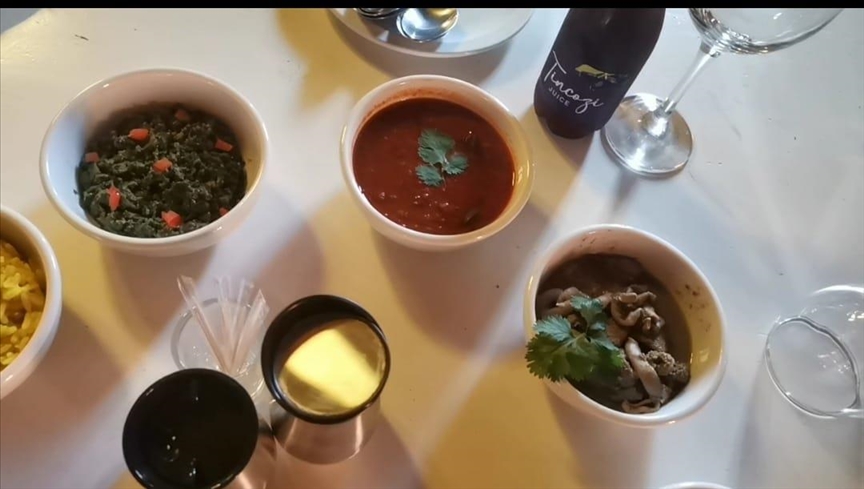Indigenous food renaissance bridges cultural divides in Eswatini
Traditional culinary practices and fusion of cuisines are helping foster social cohesion, challenging cultural and religious stereotypes

- Traditional culinary practices and fusion of cuisines are helping foster social cohesion, challenging cultural and religious stereotypes
- ‘Food in the country is becoming a source of unity and it brings everybody together,’ says religious scholar Luqman Asooka
MANZINI, Eswatini
The rising trend of returning to indigenous food systems in Eswatini, a small kingdom in southern Africa, is sparking a cultural and social revolution. By embracing traditional culinary practices, the nation is fostering social cohesion and challenging longstanding cultural and religious stereotypes.
This culinary resurgence is reshaping societal perceptions, particularly toward Muslim immigrants, who have historically faced subtle mistrust and prejudice. Now, the shared appreciation of food is opening pathways for cultural exchange, bridging divides, and fostering harmony between Swazis and Muslim communities. Ezulwini Islamic Centre’s Imam Luqman Asooka sees food as a powerful unifier. “Food in the country is becoming a source of unity and it brings everybody together,” he remarked.
Asooka noted that the Muslim community has adopted indigenous Swazi dishes, reflecting the natural blending of cultures that occurs in a diverse society.
“What is happening in Eswatini is exactly what happens when people from different cultures come to live together. They end up adopting different types of food,” he explained.
"We come from different parts of the world – Asians, white people, Muslim brothers from other parts of Africa – and all have their own special cuisines. For example, Asian Muslim brothers are famous for rich spices, and Swazis now enjoy those spices in their homes and functions too.”
New era for local cuisine
The growing culinary exchange has even influenced Swazi cooking habits. Many locals now incorporate Asian spices to add flavor and aroma to their meals, creating a fusion of tastes that reflects the blending of cultures.
For some businesses, this culinary convergence has proven to be a winning recipe. Dolores Godfrey, an 83-year-old restaurateur and owner of Edladleni, a popular eatery specializing in indigenous and organic meals, has embraced the influence of Muslim cuisine.

Dolores Godfrey, owner of Edladleni restaurant
“The Muslim community here has had a very positive effect on local dietary habits,” Dolores said.
“Their food is clean and Swazi food is simple, so combining ideas from both just enhances what we have.”
At her restaurant, Dolores has made it a mission to revive and showcase indigenous foods. Her flagship offerings celebrate Swazi culinary traditions while integrating the subtle influences of Muslim cuisine.
“Swazis are simple eaters, but Asian Muslims bring their spices, and that has been very positive for me,” she quipped.
Embracing healthy choices
Edladleni’s patrons are enthusiastic about this fusion of traditions. Fatima Juma, a frequent customer, praised the health benefits of Swazi delicacies.
“I do enjoy Swazi food. Most of the time, I come to this restaurant to enjoy healthy, halal meals. I personally love vegetarian dishes like jugo beans rolls paired with water barrie juice. My fellow Muslims enjoy goat meat and pumpkin leaves stew,” she shared.
Asooka also emphasized the religious principles that guide Muslim dietary practices. “As far as Islam is concerned … we’re allowed to eat what God has provided, but there are guidelines on how to conduct ourselves in matters of food," he explained.
Dolores echoed this sentiment, underscoring the divine connection between food and culture. “The Creator … gives food to every nation. He couldn’t have created Swaziland and then told us to look elsewhere for sustenance. We have our own foods,” she asserted.
Overcoming a colonial legacy
While celebrating culinary exchange, Dolores remains critical of the colonial legacy that sidelined African indigenous food systems.
“Our food, our indigenous crops were so neglected, and Swaziland and Africa generally have always been portrayed as a hungry and begging society,” she said.
“Of course, we know, it’s that colonial history that has put us on the hungry trail.”
Even the original restaurant business models in Africa did not make sense, because their concept disregarded native food in favor of Western flavors, she added.
Dolores has collected and commercialized forgotten traditional foods and developed an exclusive organic water barrie juice, which she aims to export. She also authored two books on Swazi cuisine to preserve and promote the country’s culinary heritage.
“This was to revive our memories, to take our minds back to our forefathers. How did they live? What did they eat? I’m sure … there is a lot of stuff that I haven’t yet unearthed,” she said.
Dolores emphasized the need to reclaim traditional foods to addressing modern health issues.
“We’re full of diseases of the affluent because we are not eating correctly. Food is medicine, and our elders’ crops always had something worthwhile, not artificially imposed nutrients in their food.”
Anadolu Agency website contains only a portion of the news stories offered to subscribers in the AA News Broadcasting System (HAS), and in summarized form. Please contact us for subscription options.




